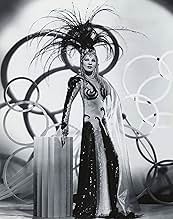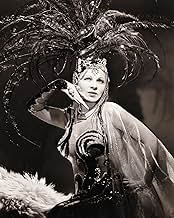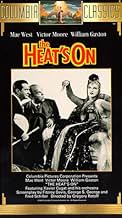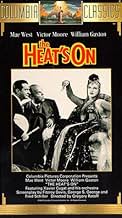अपनी भाषा में प्लॉट जोड़ेंWhen his biggest star joins a rival's show, a Broadway producer bluffs and schemes to get her back.When his biggest star joins a rival's show, a Broadway producer bluffs and schemes to get her back.When his biggest star joins a rival's show, a Broadway producer bluffs and schemes to get her back.
Leon Belasco
- Shore - the Agent
- (बिना क्रेडिट के)
Beatrice Blinn
- Babette
- (बिना क्रेडिट के)
फ़ीचर्ड समीक्षाएं
Broadway star Fay Lawrence (Mae West) wants out of her contract with producer Tony Ferris (William Gaxton). She can do it if the show does badly. A society foundation shuts them down and she jumps to rival Forrest Stanton. Tony is willing to do anything to get her back including using the same foundation and its hapless vice president Hubert Bainbridge (Victor Moore) who wants to help his niece's performing ambitions.
This is Mae West's last theatrical release before making a semi-return some three decades later. She delivers her style of comedy with less sexuality. There is some music. The songs may be appealing to some. For most of this, the lead character is actually Ferris. He's not that compelling or appealing with all his scheming. If this was written by Mae West, she would probably be the lead from the start. She does take over in the last act and that's a good section. If only the movie has more of those.
This is Mae West's last theatrical release before making a semi-return some three decades later. She delivers her style of comedy with less sexuality. There is some music. The songs may be appealing to some. For most of this, the lead character is actually Ferris. He's not that compelling or appealing with all his scheming. If this was written by Mae West, she would probably be the lead from the start. She does take over in the last act and that's a good section. If only the movie has more of those.
This mild little film is like untold dozens of minor musicals from the 1940's that were ground out by Columbia and Universal and pretty much forgotten and unseen since original release. What keeps this one in circulation is the fact that it top lines no less than Mae West, one of the cinema's greatest women stars. West was now on the eve of 50 when the movie was made, a good 20 years and then some older than most of the pinup girls that were packing in the moviegoers of the era. Presumably her limited options in Hollywood at the time persuaded to take a chance on this Gregory Ratkoff production. She took the project seriously enough to slim down, looking sensational in some gorgeous Walter Plunkett gowns and clearly spiced up some of her scenes with some uncredited but unmistakable original wisecracks. Alas, far too much time is given to musical numbers by other performers although glamorous black jazz artist Hazel Scott is fantastic in her productions. There is also perhaps a bit too much time given to the male leads, William Gaxton and Victor Moore, highly regarded Broadway stars of the era (co-stars in fact in four stage hits) but not actors who can carry a film. Even though the cast is talented and some of the musical numbers are quite good (I actually enjoyed Moore's comic number "They Never Look as Pretty as the Package"), you keep waiting for Mae West to appear on the scene again. I suspect this was true even in 1943 when her popularity was at a low point.
Mae West nevertheless manages to score some wonderful moments, notably the comic scene when Victor Moore comes up to see her sometime. Almost as good is West's confrontational scene with Moore's blue nose sister, character actress Almira Sessions. (It's interesting to note the film is one of the few times West is surrounded by performers older than herself, Gaxton, Sessions, and Moore have several years on her which may be part of the reason West looks fairly youthful in the movie in addition to being well-preserved). Starlet Mary Roche is featured as Moore's niece who longs for a show business career, her one musical number "Walbash" is actually quite pleasant but this is apparently her only film appearance, she later became a hairdresser in the film industry if that is indeed the same Mary Roche.
Some like it hot and this movie ain't so hot but we have so few Mae West movies to enjoy it is to be cherished in a way for another glimpse at one of America's great pop culture phenomenons.
Mae West nevertheless manages to score some wonderful moments, notably the comic scene when Victor Moore comes up to see her sometime. Almost as good is West's confrontational scene with Moore's blue nose sister, character actress Almira Sessions. (It's interesting to note the film is one of the few times West is surrounded by performers older than herself, Gaxton, Sessions, and Moore have several years on her which may be part of the reason West looks fairly youthful in the movie in addition to being well-preserved). Starlet Mary Roche is featured as Moore's niece who longs for a show business career, her one musical number "Walbash" is actually quite pleasant but this is apparently her only film appearance, she later became a hairdresser in the film industry if that is indeed the same Mary Roche.
Some like it hot and this movie ain't so hot but we have so few Mae West movies to enjoy it is to be cherished in a way for another glimpse at one of America's great pop culture phenomenons.
It took three credited screenwriters to come up with this flaccid comedy-musical from Columbia--and not one of them apparently had a sense of humor. Perhaps taking a page from Mae West's real-life tangles with the censors, the bawdy, naughty comedienne is toned way down here in a plot about a musical stage performer who finds herself stuck in a bomb and blames her manager; he gets a bright idea and has the show raided for indecency to drum up business, but the gag goes too far and the show is closed for good. At this point, the foolish scenarists practically lose track of Mae, which is the most indecent thing about the picture! She pops up intermittently, talking on the phone or sitting idly in the theater, but all her charm and smarm has been extinguished (she retired from films for twenty-seven years after this). The manager weasels show money out of a good-natured schnook and puts on a new revue (a nice wholesome one)--and even gets West back in the spotlight--but it's too late. The movie has collapsed around everyone like an exhausted house of cards. *1/2 from ****
Turner Classic Movies just unearthed this turkey from their vaults and, being a fan of Mae West (though not an avid one), I thought I'd give it a whirl. Big mistake! (i.e., Big disaster!) After it had unspooled, TCM's host, Robert Osborne, revealed that producer-director Gregory Ratoff had somehow obtained Mae's signature on a contract to appear in this film without her seeing a completed script. When she did get an astonished look at what she was supposed to headline, she was "furious" according to Osborne, and promptly went to work rewriting most of her scenes, adding a few (but not enough) of her trademark witticisms.
The story is more than silly and takes little advantage of Miss West's star power, and, except for Hazel Scott's interpolated production numbers, there's almost no one else in the cast to match Mae's wattage. But she looks great, slinking around in Walter Plunkett's fancifully fantastic creations and Franz Planer's glossy black-and-white cinematography makes the most of the second-tier production values typical of a Columbia Pictures programmer.
Poor Victor Moore is required to portray a pathetic boob, intimidated by a battleaxe of a sister, quite effectively embodied by one Almira Sessions. The ingénue, played by Mary Roche, probably didn't elicit many wolf whistles when this dud was shown to the troops during WW II; Lloyd Bridges has a really small role as her swain (in uniform, of course); and there's an actor named Lester Allen, playing a character appropriately called Mouse Beller, who could only be cast in a role with that moniker.
Mae West quit performing before the cameras (going back to the stage and touring with her fabled nightclub act) and didn't make another picture until "Myra Breckenridge" in 1970 (and she was arguably the best thing in that crazy curiosity). This one is only for those fans who want to get a look at what Hollywood thought it could get away with during the wartime years.
The story is more than silly and takes little advantage of Miss West's star power, and, except for Hazel Scott's interpolated production numbers, there's almost no one else in the cast to match Mae's wattage. But she looks great, slinking around in Walter Plunkett's fancifully fantastic creations and Franz Planer's glossy black-and-white cinematography makes the most of the second-tier production values typical of a Columbia Pictures programmer.
Poor Victor Moore is required to portray a pathetic boob, intimidated by a battleaxe of a sister, quite effectively embodied by one Almira Sessions. The ingénue, played by Mary Roche, probably didn't elicit many wolf whistles when this dud was shown to the troops during WW II; Lloyd Bridges has a really small role as her swain (in uniform, of course); and there's an actor named Lester Allen, playing a character appropriately called Mouse Beller, who could only be cast in a role with that moniker.
Mae West quit performing before the cameras (going back to the stage and touring with her fabled nightclub act) and didn't make another picture until "Myra Breckenridge" in 1970 (and she was arguably the best thing in that crazy curiosity). This one is only for those fans who want to get a look at what Hollywood thought it could get away with during the wartime years.
THE HEAT'S ON (Columbia, 1943), directed by Gregory Ratoff, gives some indication as to how the use of a major star heading the cast might promote theatrical attendance, but the final result turns out to be a demotion of its reputation. The star in question is Mae West returning to the big screen after a three year hiatus following her western comedy classic of MY LITTLE CHICKADEE (Universal, 1940) opposite W.C. Fields. Appropriately titled, especially for a Mae West movie, THE HEAT'S ON should be categorized as a Mae West movie not to be a Mae West movie. A throwback to her motion picture debut of NIGHT AFTER NIGHT (Paramount, 1932), where West's character arrives late into the story, allowing the leading actors, as headed by George Raft, to be showcased to best advantage in his first starring role, but at least with West's limitations reciting her own one-liners made the movie watchable. For this production, she surprisingly has very little to do, practically taking the back seat to other performers, and in spite of some of her traditional witty one-liners, usually the best part of her movies, there isn't enough of her or her sayings to produce any highlights. In one scene, West says "If I stay with this show, I'll ruin my reputation." A pity she didn't take her own advice. Eight movies and 11 years later, Mae West continued to receive star billing above the title, but this time has her name shared along with Victor Moore and William Gaxton. Now at age 50, and appearing physically younger than in her previous films, especially now sporting a Betty Grable-type headdress, but never exposing her legs wearing those long styled dresses, there's very little of her to recommend. Had this Columbia musical starred studio contract players as Ann Miller or Evelyn Keyes, then THE HEAT'S ON would have been just another one of those hundreds of slightly entertaining hodgepodge musicals churned out during the World War II era, but with Mae West's name on the marquee, the final result is quite disappointing.
Story: Believing that her forthcoming musical, "Indiscretions" is destined to flop, its leading actress, Fay Lawrence (Mae West), decides to leave producer Tony Ferris (William Gaxton), to star in a revue, "Tropicana," for rival producer Forrest Stanton (Alan Dinehart). Following the opening minutes which sets the pattern to the story, the duration revolves mostly around Tony trying to get Fay back while Fay sits inside the theater with Stantion to watch numerous talented celebrities auditioning in musical acts planned for the show. In between acts, the story shifts over to Hubert Bainbridge (Victor Moore), a middle-aged man attempting to get his niece, Janie (Mary Roche) to be headlined in Tony's show. In spite of his moral-minded sister (Almira Sessions) wanting to close the show, Janie really prefers her soldier boyfriend, Andy Walker (Lloyd Bridges), than a show business career anyway, thus leaving Tony with no headliner.
On the musical program, songs include: "I'm a Stranger in Town" (sung by Mae West); Specialty number conducted by Xavier Cugat with Lina Romay vocalizing in Spanish; "There Goes That Guitar, There Goes My Heart," "Antonio" (both sung by Romay); "The White Keys and the Black Keys" (sung and performed by Hazel Scott on piano); "Thinking About the Wabash" (sung by Mary Roche and male singer); "The Cailssons Go Rolling Along" (a military number sung by Hazel Scott/ performed by black soldiers); "They Looked So Pretty on the Envelope" (sung by Victor Moore); "Hello, Mi Amigo" (finale with Mae West and chorus). So many songs, none for the hit parade.
Out of circulation on the television markets in nearly 40 years, and distributed on video cassette for a limited time during the early 1990s, THE HEAT'S ON was resurrected again, thanks to Turner Classic Movies cable channel, where it premiered the evening of April 25, 2005. In spite of many negative reviews, then and now, it's good having it resurrected again mainly because Mae West had taken part in it. After viewing THE HEAT'S ON, it's quite understandable why West preferred to ignore it as part of her filmography. But the failure should not be blamed entirely on West. According to Bob Osborne's opening and closing statements, West had no say in the matter, having committed herself into doing this without reading the script, simply as a favor to director Gregory Ratoff (who played her Russian attorney in one of her best comedies, I'M NO ANGEL back in 1933). The only thing going for THE HEAT'S ON is the humorous scene involving West as she entertains Victor Moore in her boudoir by dancing the rumba, and at the same time, he trying to keep his toupee from clipping off. There are some instances near the start of the story where West is expected to make a nifty comeback in between conversations with Gaxton, but with some of the wittier lines going to Gaxton, there appears to be either abrupt fade-outs or cuts to the next scene to prevent West from saying anything worth hearing. Some West quips have made it to the finished product, others haven't. A pity.
With this almost marking the end to Mae West's movie career, this would not be her finish, not by a long shot. She continued to perform on stage and night clubs throughout the years, returning to the big screen with MYRA BRECKENRIDGE (1970) and SEXTETTE (1978), none recapturing the magic she fulfilled during the Depression era 1930s, the sort of movies West fans prefer to remember her best. (**1/2)
Story: Believing that her forthcoming musical, "Indiscretions" is destined to flop, its leading actress, Fay Lawrence (Mae West), decides to leave producer Tony Ferris (William Gaxton), to star in a revue, "Tropicana," for rival producer Forrest Stanton (Alan Dinehart). Following the opening minutes which sets the pattern to the story, the duration revolves mostly around Tony trying to get Fay back while Fay sits inside the theater with Stantion to watch numerous talented celebrities auditioning in musical acts planned for the show. In between acts, the story shifts over to Hubert Bainbridge (Victor Moore), a middle-aged man attempting to get his niece, Janie (Mary Roche) to be headlined in Tony's show. In spite of his moral-minded sister (Almira Sessions) wanting to close the show, Janie really prefers her soldier boyfriend, Andy Walker (Lloyd Bridges), than a show business career anyway, thus leaving Tony with no headliner.
On the musical program, songs include: "I'm a Stranger in Town" (sung by Mae West); Specialty number conducted by Xavier Cugat with Lina Romay vocalizing in Spanish; "There Goes That Guitar, There Goes My Heart," "Antonio" (both sung by Romay); "The White Keys and the Black Keys" (sung and performed by Hazel Scott on piano); "Thinking About the Wabash" (sung by Mary Roche and male singer); "The Cailssons Go Rolling Along" (a military number sung by Hazel Scott/ performed by black soldiers); "They Looked So Pretty on the Envelope" (sung by Victor Moore); "Hello, Mi Amigo" (finale with Mae West and chorus). So many songs, none for the hit parade.
Out of circulation on the television markets in nearly 40 years, and distributed on video cassette for a limited time during the early 1990s, THE HEAT'S ON was resurrected again, thanks to Turner Classic Movies cable channel, where it premiered the evening of April 25, 2005. In spite of many negative reviews, then and now, it's good having it resurrected again mainly because Mae West had taken part in it. After viewing THE HEAT'S ON, it's quite understandable why West preferred to ignore it as part of her filmography. But the failure should not be blamed entirely on West. According to Bob Osborne's opening and closing statements, West had no say in the matter, having committed herself into doing this without reading the script, simply as a favor to director Gregory Ratoff (who played her Russian attorney in one of her best comedies, I'M NO ANGEL back in 1933). The only thing going for THE HEAT'S ON is the humorous scene involving West as she entertains Victor Moore in her boudoir by dancing the rumba, and at the same time, he trying to keep his toupee from clipping off. There are some instances near the start of the story where West is expected to make a nifty comeback in between conversations with Gaxton, but with some of the wittier lines going to Gaxton, there appears to be either abrupt fade-outs or cuts to the next scene to prevent West from saying anything worth hearing. Some West quips have made it to the finished product, others haven't. A pity.
With this almost marking the end to Mae West's movie career, this would not be her finish, not by a long shot. She continued to perform on stage and night clubs throughout the years, returning to the big screen with MYRA BRECKENRIDGE (1970) and SEXTETTE (1978), none recapturing the magic she fulfilled during the Depression era 1930s, the sort of movies West fans prefer to remember her best. (**1/2)
क्या आपको पता है
- ट्रिवियाThis was Mae West's final film until Myra Breckinridge (1970) 27 years later.
- गूफ़On a wall of a producer's office is a presumably old publicity shot of Fay wearing an elaborate headdress that she doesn't actually wear until she performs a musical number later in film for an entirely new production staged by rival producer.
- भाव
Fay Lawrence: [singing] If you want things put in order, Come and see me south of the border...
- साउंडट्रैकI'm Just a Stranger in Town
(1943)
Music by Jay Gorney
Lyrics by Henry Myers and Edward Eliscu
Copyright 1944 by Mills Music Inc.
Performed by Mae West (uncredited) in the show "Indiscretions"
टॉप पसंद
रेटिंग देने के लिए साइन-इन करें और वैयक्तिकृत सुझावों के लिए वॉचलिस्ट करें
विवरण
- रिलीज़ की तारीख़
- कंट्री ऑफ़ ओरिजिन
- भाषाएं
- इस रूप में भी जाना जाता है
- Sinfonías dislocadas
- उत्पादन कंपनी
- IMDbPro पर और कंपनी क्रेडिट देखें
- चलने की अवधि1 घंटा 19 मिनट
- रंग
- पक्ष अनुपात
- 1.37 : 1
इस पेज में योगदान दें
किसी बदलाव का सुझाव दें या अनुपलब्ध कॉन्टेंट जोड़ें




































